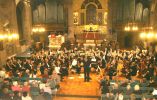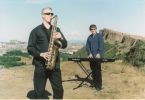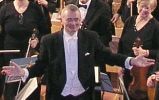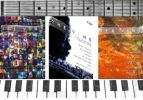Music Reviews 2005
ACCORDES - Tudor and Jacobean Lute Songs
Weds 20 July at St John's
Accordes is a sort of subgroup or offshoot of Partita, longstanding Fringe performers with a well-earned reputation in their own musical field. Accordes consists of just three performers, two singers and one lutanist, Roger Child, all familiar from Partita.
Their particular repertoire was Tudor and Jacobean lute songs, by Dowland, Campion, Orlando Gibbons and others, and dances for combinations of recorders and lutes. Many of the pieces are wonderfully beautiful, more of them consciously sad and reflective than are cheerful. The two singers, Sasha Johnson Manning (soprano) and Holly Marland (mezzo) both have remarkable voices, with clear tone, no vibrato, precise diction, beautiful line, and an air of total engagement with the music and the audience. There were lovely moments when the singer's voice seemed to hang suspended in the air, and you wanted it never to stop.
It is obviously difficult to inject variety into a programme of this kind, and with so few performers. Much was done by alternating the singers, varying the the numbers performing, using the instrumental pieces for a change of flavour. The musical sequence was arranged to give contrast, but there was a lot of lamenting, with a sometimes almost erotic quality to the melancholy that's presumably characteristic of the period. However, the voices and the instruments wound round each other very sweetly, and it would have been churlish to do other than relax and enjoy it.
UB
AMARETTI CHAMBER ORCHESTRA - Concert Among Friends
St John's Church, Sunday July 10th
The Amaretti Chamber Orchestra was formed less than a year ago but this enterprising ensemble is exploring the repertoire with enthusiasm.
For their Fringe debut the Amaretti chose a relatively 'light' programme which was well-received by an attentive audience. At the end of a long, hot day the selection of 'small' pieces was ideal. The bright acoustic of St John's Church was well-suited to the clean string lines.
The Amaretti began with Elgar's Serenade for Strings. Louise Latham - the highly experienced and enthusiastic conductor - asked us to imagine that the music showed us Elgar cycling in the Malverns. The outer movements were free-flowing and relaxed. The middle movement - more contemplative, perhaps brooding - providing contrast (and those of us used to walking and cycling in the hills recognise that uphill is a good deal tougher than down!)
Albinoni's Oboe Concerto in D minor was the second piece. Albinoni was an amateur composer. A Venetian contemporary of Vivaldi, Albinoni was a skilled and conscientious composer and his work was highly regarded by Bach and Handel. Alfred Pollard was the soloist playing the notoriously tricky oboe with great poise and control.
The first half of the programme was rounded of by Mozart's Divertimento in D major. Composed when Mozart was 16 this may have been expected to have been 'background' music but Mozart seems to be saying "ignore me if you dare". Certainly there was plenty of energy flowing from the 20-piece orchestra.
The second half began with Sir Michael Tippett's Little Music for String Orchestra. This year is the centenary of Tippett's birth and this piece dates from 1946. The most overtly serious and intense offering in the programme, Little Music provides a manageable introduction to his work.
The final piece in the programme was a student composition by Carl Nielsen - his Little Suite. This was an earnest piece - as you might expect from a young composer learning his craft and perhaps influenced by Scandinavian works. The brisker central waltz movement was lighter in mood.
The Amaretti Chamber Orchestra is made up of experienced musicians and is well-lead by Mary Anderson and Brigid Rawling. It is to be hoped that they feel sufficiently encouraged by their Buxton Fringe debut to return next year. It will be interesting to see how they develop.
The Amaretti Chamber Orchestra can next be heard on Saturday, September 10th at St Andrew's Church, Cheadle Hulme.
KS
ANGELA ROWLEY AND ANNA LE HAIR - 'Isn't it Rich?'
Taken from Sondheim's legendary 'Send in the Clowns', 'Isn't It Rich' is the title of soprano Angela Rowley's concert, held at the Methodist Church on 19 July. Her repertoire ranged from show tunes to operatic arias, from German lieder to modern settings of poems, displaying an admirable versatility.
Ms Rowley's pleasing voice showed tremendous versatility in tackling whichever genre the programme dictated, although she seemed particularly sympathetic to the lieder. With expressive features and precise body language, she conveyed the meaning of each song, while her crystal-clear enunciation more than made up for the occasionally echoey acoustics of the venue. I was pleased that she didn't over-emote the songs, even one as potentially sentimental as Amanda McBroome's 'The Rose', instead conveying its emotion with great simplicity.
Special note should also be made Anna le Hair's sensitive and meticulous accompaniment, never more so than on Benjamin Britten's setting of WH Auden's 'Fish in the Unruffled Lakes', where accompanist and soloist both seemed to carry on their (fiendishly difficult) parts independently of each other, but still created a beautifully melodic sound in the process.
Angela Rowley was pleasingly clear and succinct in her introductions, explaining each item with humour and clarity, in a programme which contained something for everyone.
Robbie Carnegie
BUXTON BRASS QUINTET - Tea for two, plus three-at four!
Weds 20 July at the Methodist Church
This was a very cheerful afternoon happening, much appreciated by a sizeable audience of all ages - and preceded by tea and cakes provided by the Devonshire Bakery, which went down a treat and set us all up nicely.
The music was a bit of almost everything, starting brassily (why not?) with a stirring Sousa march, and stretching from the sublime (Mozart's Ave Verum Corpus - for brass quintet?!) to, as they said themselves, the ridiculous (Rossini's William Tell, played very fast). You can decide for yourselves into which category you'd put Pachelbel's Canon, or A Nightingale sang in Berkeley Square. And so on: the Pink Panther was classic jazz sounds, special fun for the trombone, the Teddy Bears' Picnic was an opportunity for the tuba, and the aforementioned Nightingale was big-bandish and swoony.
The final section was a Last Night of the Proms, Henry Wood Sea Songs, complete with stamping and clapping during the Hornpipe, etc, Elgar's Pomp and Circumstance ? 1, and Jerusalem. The grownups in the audience sang along (words provided), and the children let off party poppers and streamers - and the French horn player had the biggest party popper of all, a small cannon, in effect.
This was the Quintet's second concert, after a collaboration last Christmas with Buxton Brass Band, which followed from Alex Williams, trumpeter, teaching a Buxton children's brass group. They have also been going into local schools to spread the word and their enthusiasm. Lucky children to have such an example of the pleasure of live music, all kinds of music, and all coming from those alluring brass instruments, and a chance to try for themselves. And for their Third Concert ... ?
UB
HIGH PEAK ORCHESTRA - Summer Concert

Hurrah for Andrew Hodkinson and the High Peak Orchestra! The only orchestral programme to be found in Buxton during the Festival. What is more this is an orchestra that is constantly improving, so much so that they can now present programmes of the kind brought to this year's Fringe. It was, in fact, most interesting programming with pieces by different composers all of whom speak with distinct musical voices inspired by their national dialect
The main work was Sibelius' 5th Symphony - not at all a work for faint hearts there being many opportunities for disaster. The symphonies of Sibelius are always a problem. Is the construction logical as supporters claim or is it random as some adverse critics maintain? The HPO went for the former and the result was a fine performance.
The programme opened with some pieces from Grieg's Sigurd Jorsalfa Suite Op 56. Here is Grieg in his most distinctive Norwegian mood grasped by some most beautiful playing from the HPO's 'cello section. This was followed by Dvorak's Romance in F minor Op 11 with soloist Steven Wilkie. Like Grieg, Dvorak also developed a distinctly national style, in his case prompted by Bohemian reaction to Austrian imperialism. The Romance is quite lovely, without reserve or affectation, and Steven gave an inspiring performance.
But perhaps the high spot in the programme was Mayuzumi's Concerto for Xylophone. Composed in 1965 this is something of a rarity in Buxton. But what a wonderful romp it was, this time with the nationalist flavour being Japanese. Young Jonathon Ormston the soloist, who is still at school, gave a sparkling performance of astonishing skill which left the audience gasping with admiration. Clearly a musician with a bright future ahead of him.
P.L.
Sadly no more performances in this year's Fringe but look out for the HPO in the 2006 Fringe.
IAN MILLAR & DOMINIC SPENCER - Jazz from Scotland

The Orchestra Pit - Monday, July 18th
Ian Millar (tenor sax) and Dominic Spencer (keyboards) made their Fringe debut last year and were well-received. There is no reason to doubt that they will go down just as well this year.
They play a straightforward jazz - restrained, melodic, strong rhythmically. The absence of a drums/bass rhythm section is rarely noticed with Dominic filling in.
Their repertoire is a mixture of standards (Georgia, Autumn Leaves, Night and Day) and originals by Ian which are equally easy on the ear. The ballads are delivered with great conviction and warmth; the more up-tempo numbers are played with certainty. All the tunes are well-structured. They don't take liberties with the material - no squeals or screeches, free-form passages or awkward time signatures which challenge the ears and patience of some listeners.
So expect warm, intelligent, reflective, human music. Let yourself relax a little, forget about what's going on outside and allow yourself to be absorbed by the music of a duo who have a good understanding of their music, each other and their audience. Today's lunchtime audience lapped it up - chances are you will too.
Ian Millar and Dominic Spencer are at the Orchestra Pit right through until July 23rd playing twice each day - from 12.30 - 1.30pm and from 10pm to midnight.
KING EDWARD MUSICAL SOCIETY OF MACCLESFIELD - Music for a Summer Evening

Tuesday, July 19th, Trinity Church
Typical, I suppose, that having had the best weather for a Fringe I can remember that for this evening of summer music it turned it a bit damp and miserable. That didn't stop over 100 people filling Trinity Church to have their spirits cheered by KEMS.
KEMS is based in Macclesfield and runs a choir, a symphony orchestra and a wind band. For this evening's concert we had a scaled down chamber orchestra. Works of undoubtedly great composers - Mendelssohn, Mozart and Schubert - made up the programme even if these youthful works didn't represent their mature greatness. That said it is a bit staggering to think that young men composed this music aged 18, 19 and 20!
Even if these were 'immature' works they offered plenty of challenges for an amateur orchestra and KEMS rose to most of them. The orchestra has a good deal of experience within its ranks and you got the feeling that this repertoire is what they enjoy playing - certainly the audience enjoyed listening.
Mendelssohn's Fingal's Cave Overture employed the whole orchestra and the woodwind and horns had plenty of chance to shine. The conductor, Anthony Houghton, suggested that the piece evoked both the fury of the sea as well as the occasional calm.
For Mozart's Violin Concerto No. 3 Nicola Bright was the soloist. Nicola is usually the orchestra's leader - for tonight she had even more of the limelight. Nicola was playing a new violin - new to her that is since it was made in 1820. Evidently she was pleased with the instrument as she tackled the taxing role with energy and fluency. The orchestra supported her well - with Tricia Sawkins taking Nicola's part as leader.
After the break we heard Schubert's Symphony No. 3. This, perhaps, produced the best playing from the orchestra as a whole. Anthony Houghton kept the sections together well and energy levels were high.
After this undoubted success it is to be hoped that our friends from over the hill - if you pardon the expression - will return next year.
For more information on the activities of KEMS see kems.members.beeb.net
MANCHESTER RECORDER ORCHESTRA - Concert
Saturday 23 July 2005 St John's Church
Recorders, and recorder players, in such numbers are an unusual experience for most of us. Many people have a go while at school, and then the instrument languishes in a drawer, and the players move on to other musical scenes, or drop out. Not these ones, however. The orchestra was 40 - plus strong last night (minus a handful of players who also sing with the Hall, and are therefore in London for a Proms performance tonight: multi-talented), their instruments going from tiny Sopranino to magnificent Contra Bass, looking and sounding like a young organ pipe.
The music was mostly, not surprisingly, adapted for recorders rather than originally for them, some settings working better than others. We began cheerfully with The Late Arrivals, on the opposite principle to Haydn's Farewell Symphony, starting with a single treble, and ending with the full gamut. Warlock's Capriol Suite is based on sixteenth century dances, and though I missed the original orchestration, the piping winds fitted well. The Chaconne by Vitali, with violin solo part (John Resek) so non-stop that he had his music on a long sheet on two music stands, to save turning, seemed a less happy combination. This was not, certainly, for any lack of skill in the performers, but just from the way the instrumental sounds worked together. Pieces by Purcell and Torelli with solo trumpet (Cecil Hayward) worked better; perhaps the wind sounds, for all their different tones suited each other more. There was also an adaptation of a concerto for 4 violins by Vivaldi, enjoyable and played handsomely, but not among his greatest works.
Of the pieces written for recorder orchestra, one, composed for the National Society of Recorder Players, was first played at their convention by 385 players, a frankly terrifying thought. Another was composed for the Society by one of this evening's conductors, Dennis Bamforth. I felt the most successful was Riffs, Lament and Jazz, by Alan Melville, a recorder player himself, where the cross rhythms and syncopations, indeed the whole tone of the piece, seemed to speak in their own language, rather than leaving the listener half expecting the standard orchestral sound spectrum.
The evening's audience gave every sign of enjoying itself, and the drinks and small eats offered in the interval enhanced the general feel of a gathering of fellow enthusiasts. It may have its equivalents all over the world, but it felt like a very English occasion, very proper to the Fringe.
MARGENTO - Musical Paintings Out Of the Poetry Oven

A few years ago this group could not possibly have given public performances in their homeland Romania let alone visited Buxton. That they can now do so shows how far we have come from the days when Ceausescu, the Romanian dictator, pursued his career as a mass murderer and managed, single-handed, to wreck the Romanian economy.
Chris Tanasescu, a poet, has brought with him a talented group of keyboard, percussion, vocalist and graphic artist. He reads, or rather, performs his poems to musical and vocal accompaniment while at the same time the artist creates a "painting " made up from patches of different colours. The keyboard music composed specially for the occasion is somewhat sombre matching the mood of the poetry but that is partly offset by the high register of the vocalist. The total effect is unusual and remarkable.
As a concession to non-Romanian speakers, which means just about everyone in Buxton, many of the poems are in English. From them we get a glimpse of the poet's tortured soul and reminders of how serious and dangerous life was in Eastern Europe.
For those who are interested in, what for Buxton, is distinctly avant-garde, techniques and ideas in advance of the generally accepted, this is just the thing.
P.L.
More performances on 13 July at the Old Hall Hotel at 10.00pm and on 14 July at St. Anne's Community Centre at 3.00pm.
PARTITA - Mediaeval, Renaissance and Baroque Music
St John's Church - Monday, July 18th
Partita are regulars at the Fringe now and have built up a loyal following for their recitals of Early Music. Tonight's programme included much little-heard and rare material - largely thanks to the researches of Roger Child.
With the resources at their disposal - lutes, harpsichord, recorders, cello, viol as well as two voices (soprano and mezzo soprano) - Partita are capable of a great range of sounds and combinations of instruments.
The first half of the programme was made up mostly of rarities - including the mildly bawdy and the deeply spiritual. At the sublime end of the scale was a song composed by Tarquino Merula Hor ch'e tempo di morire in which Mary reflects on the painful death that awaits her infant son Jesus. This was beautifully song by Holly Marland (mezzo) accompanied by Roger Child (theorbo - a five foot long, lute-like instrument) and Jill Lingard (harpsichord).
The bawdy was represented by Malona mia cara - but this was sung with such charm by Holly and Sasha Johnson Manning (soprano) that it was only the translation that allowed most of the audience in on the sauciness.
Holly and Sasha combined for another song Susanne un jour - a protest against a threatened innocence and this was sung with a matching purity of tone.
In a full and varied programme it would be difficult to pick-out highlights but the concluding music to the first half seemed especially effective. The melodies of the theorbo were echoed by the harpsichord in Piccinni's Chiaconna. The same two instruments provided a march-like figure for the freer flights of sound for the recorders in van Wichel's Ciagogna.
The second half of the evening took us to more familiar territory - including Purcell's O let me weep (Sasha sounding suitably tragic here), a Bach suite (more usually heard these days on guitar but tonight on theorbo which Roger reckons most closely matches the sound of the baroque lute) and a Vivaldi sonata for harpsichord and theorbo.
Three quarters of Partita - under the name of Accordes - are giving a recital of Tudor and Jacobean lute songs on Wednesday, July 20th - again at St John's.
PROJECT ADORNO - Electro Pop Heroes

Old Clubhouse
Electro-pop heroes? I could name a few. The Human League - Philip Oakey, masculine in mascara, Joanne and Susan, ungainly dancers; Soft Cell - Marc Almond, histrionic and fragile; The Pet Shop Boys - sardonic and static.
That's what Electro-pop heroes means to me. Was I expecting a nod towards the legends of the 1980s synth sound in Project Adorno's show? Maybe. I wasn't necessarily expecting two bespectacled, be-suited men - one a librarian, one a user of libraries - wandering about the stage in a deliberately ramshackle way: one fiddling with a minidisk player to provide backing, occasionally strumming a guitar; the other dancing uncoordinatedly and singing along with more exuberance than skill.
They name-dropped their influences, and I could certainly detect the Gallic influence of the likes of Jacques Brel, but there were also hints of Jarvis Cocker and Neil Hannon, as well as the fondly remembered, papier-mach headed Frank Sidebottom.
Their songs, by their own admission had three main themes: libraries, painters and Doctor Who. So we had love songs to Germaine Greer and Davros (creator of the Daleks), fanciful evocations of Picasso's cockney years and Dali's refusal to do the washing up, and a jolly song of praise to Tom Baker.
There were times when one felt that it might almost fall apart, so apparently unconcerned were Project Adorno in putting on something approaching a traditionally organised show, but somehow it seemed to hold together in a bizarrely enjoyable hour of nerdy oddness.
Robbie Carnegie
PUBLIC-I - Music on the Market Place 6
The opening band for the Music on the Market Place Festival was also the youngest.
Malisma started the day of music at 3 o'clock with a series of covers including American Idiot by Greenday, Last Train Home by Lost Prophets, The Reason by Hobastank and Radio/video by System of a Down. They were so popular the general consensus was for an encore which they gave in the form of Zeffer by Red hot Chilli Peppers.
Malisma played one of their own songs, Forgotten which was well received by all. If they make more of their own they could become a regular sight in pubs when they get older.
The band were really energetic but the drummer overcast the music sometimes because he was louder compared to rest of the band. Overall a very good perfomance especially the drummer and bass player in Radio/Video which made it the best they performed.
Pocket Lemon were the first band to play at Level Two and had ties to there as they are regular players in Level Two. Pocket Lemon have a good mix of stlye and tempo using the keyboard to good effect. The band itself is very good all members been excellent musicians but they were slightly let down by the singer who wasn't always clear making some of the vocals harder to pick out.
Stand out and Riot were the 3rd band to play overall, the second at the eagle. This was their 50th gig and they carried it with style and flair. Sand Out and Riot are a scar band and used the fast pace of their music to full effect when performing moving about as much as possible in the small stage. The crowds favourite was toast a song about breakfast and any repeat performances would be welcome in Buxton.
At 8 0'clock in Level Two Myoho kicked off. The crowd reaction was great and the dance floor was full of poeple. As the band continued they got more involoved with the crowd the dance floor got fuller and unsurprisingly they were asked for an encore. Throughout their perfmace tehy keep up a fast paced tempo with an amazing drum solo in one song. For anyone who want to see more of them they are playing in Manchester Academy Three in August.
Anonymouos
SHEFFIELD CITY OPERA - A Gala Night of Song
It was good to see Sheffield City Opera back on the Fringe - and with a completely new programme. This year we were given a wide selection of pieces from opera operetta and musical theatre and even a Gershwin piano solo from the conductor, relinquishing his baton for the keyboard.
The company are fortunate to have some fine voices and we were able to enjoy some notable vocal solos , Joanna Shacklock with O My Beloved Father from Puccini's Gianni Shicci, a delightful Batti Batti from Don Giovanni given by Janet Stanton and Angela Drake with a touching performane of Britten's Johnny. Particularly effective also was a Noel Coward medley with Melvyn Osborne at keyboard in a duet with Janice Hancock singing I'll See You Again, one of Coward's favourite compositions and one of his greatest hits. Coward could be quite scathing about the way this song was sometimes mangled but I think he would have liked this straightforward performance.
But the surprise in the programme came when a young lade, Kristina James, got up from the audience and gave a stunning performance of Una voce poco fa from Rossini's Barber of Seville with all the verve and vocal showiness that can drive Italian audiences wild with excitement. It certainly excited the large audience in St John's Church. We would have liked to hear her sing again.
It says something about the confidence of SCO in their ability to please that their printed programme contained the encore to be performed after their final number! But we all welcomed it.
P.L.
No more Fringe performances this year.
THE ORGAN - Mr Handel's Maggott
This illustrated talk takes one side in an argument. Did Handel use the organ in his oratorios? The problem is that the scores do not show an organ part. Some musicologists take this as an indication that the answer to the question must be No.
But Dr. Brian Hick, editor of The Organ, has the opposite view.
In a short talk illustrated with recorded excerpts from the oratorios and some of Handel's coronation music Dr. Hick enthusiastically and persuasively set out the case for organ continuo in the oratorios. We know from surviving programmes that Handel usually played an organ concerto after the conclusion of an oratorio so there was definitely an organ at the theatre. Did he play it during the oratorio while he conducted the orchestra? It seems a short step to establish that but it is against the evidence of the score. Dr Hick, though, has all the facts at his fingertips and .his obviously deep knowledge of the way in which eighteenth century music was performed encouraged the audience to accept his point of view. So much so that when he called for questions at the end no-one disagreed with him. This is not just a sterile academic exercise. If Dr Hick is right and his views are accepted it could change dramatically the future performance of Handel oratorios.
This may not sound much like entertainment but in fact it was hugely entertaining thanks to a large extent to Dr Hick's engaging style. He had also mastered the highly uncertain acoustic of St John's Church so that, miraculously, we could all hear what he said without amplification.
P.L.
THE VINE MAGAZINE - Shameless Advertising for The Vine Magazine

Thursday 14 July
Piano Lounge, Old Hall Hotel
Sometimes with this reviewing lark you get sent to something and think 'Why am I here? What can I write about that?' There are other occasions when you feel totally blessed. This was one such occasion.
Now to say this evening was relaxed would be an understatement, but if that suggested that it was in any way careless or there any indifference in the performances would be terrible. No, we had an evening of music played and sung with love and affection. Much of it should have been kicked into touch by the punk revolution and some might find it 'flakey', but for me it was a joyful tonic.
The Vine magazine is published every two months; it's free and is packed full of information about 'the arts' and events in the Buxton area. Such a description fails to capture any of the personality of the magazine and its contributors. This evening - put together by some of those who produce The Vine - showed it to be friendly, approachable, humorous, witty, supportive, committed and, yes, relaxed.
The tone for the evening was set by Michael Clement (brown guitar, black guitar, piano and vocals) who knows a good song when he hears one and doesn't care whether it is fashionable. His first set included a beautifully reflective Redemption Song accompanied by his piano and 'Bongo' Bob.
LowLowLowLaLaLaLoveLoveLove did a 'quiet set' of original songs, so delicate and light the sound floated like gossamer.
Each of us will have our own highlights from this evening. Some will have especially treasured Janet Galloway's The Way You Look Tonight - nimbly accompanied by Dave Morton's and Gary Booth's guitars. Janet and Michael joined vocal forces to deliver Sting's Fragile so compellingly. Jess Booth sang a couple of songs - a young performer but she had the complete attention of the audience from the first chord. Martin Hall sang just two songs - accompanied by a heavenly chorus from the wings.
LowLowLowLaLaLaLoveLoveLove completed the evening with what may have been 'the loud set' - though you would not necessarily have known it. But by then it was 1130 and entertainments were legally at an end. It would be unfair to pick out anyone but Chris Robinson was marvellous.
There is more Shameless Advertising for The Vine Magazine on Thursday, 21 July. Get there early if you want a seat - it will more rehearsed, there will be more Martin Hall and some additional stuff.
www.buxtonvine.co.ukLowLowLowLaLaLaLoveLoveLove are at 'The George' on 27th July.
KS
TRINITY CHURCH - Paul Wheater, Yorkshire's Jim Reeves, sings Country/Gospel

A warm and enthusiastic welcome from a small army of stewards set the scene for an evening of music from Paul Wheater in the truly lovely setting of Trinity Church. At 8 o'clock in the evening the sun was still streaming in through the church windows and the audience chatted in excited anticipation awaiting the appearance of Paul Wheater.
One man and his guitar entertained the audience for an hour and a half. Paul has a rich and resonant voice. The songs soon had the audience clapping and singing along and Paul had a fine collection of anecdotes to help the evening go with a swing. Here was a man who was clearly used to entertaining audiences and using his considerable vocal talents to share his beliefs with those he had come to meet. There seemed quite a shift between the bluff Yorkshireman and the transatlantic flavour of many of the gospel numbers. The Christian message was clearly presented in both song and anecdote and the evangelical nature of the evening was quite a surprise. There was no doubting the sincerity of the message and many members of the audience were clearly moved by Paul's stories and songs. At the end of the evening the members of the audience were invited to chat to Paul and to enjoy the refreshments provided by the venue. A voice well worth listening to!
Maggie Dealey.
UNIVERSITY OF DERBY THEATRE ARTS - Late 'n Live!
Old Hall Hotel, Orchestra Pit 8-17 July, 10pm-midnight
'We learnt all these songs today so thanks for coming to our virgin voyage...' There was a rather haphazard flavour to the first of University of Derby Theatre Arts' Late 'n' Live sessions, with the three-man rock outfit of Ryan Smith, Rob Dobson and Matt Bartram trying to explain that they were in fact two bands - Don's Mobile Barbers and A Million Billion - who had recently come together for the Fringe.
'These guys are from Leicester and I'm from Brooklyn; we met online in a chatroom. They said they were sixteen-year-old girls...', elaborated the big-haired singer and keyboardist Ryan with a grin. Unfortunately the 'two bands' had to perform in front of only half an audience but once they had decided to play (it was nearly an hour before anything happened), they gave it their all and revealed an instinctive rapport with each other creating a tight, exciting sound with their keyboards, drums and single electric guitar.
Influenced by bands such as Pinback and Mercury Rev, they moved from slow American folk-rock to songs experimenting with different electronic sounds to askew love songs with lyrics like: 'Forget the Ice Age and all your frozen dinosaurs/ In Alaska I can't sleep...'
By contrast the small audience of cosy couples cocooned in the weird, womb-like atmosphere of the subterranean Orchestra Pit was all too inclined to nod off or else indulge in the other kind of activities normally reserved for bed. The heart sank a little when after a dirge-like number the boys announced 'We're going to slow it down now', but when they picked up the tempo they were a revelation showing a great sense of rhythm combined with haunting, Jeff Buckley-like vocals.
Smith had recently performed with The Silent League at the O2 Music Wireless Festival in Hyde Park and there was a professionalism about their music that belied the rehearsal nature of their presentation.
Late 'n' Live continues through the Fringe and promises a fascinating mixed bag of musical treats so do check it out.
Stephanie Billen.